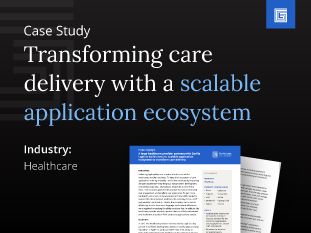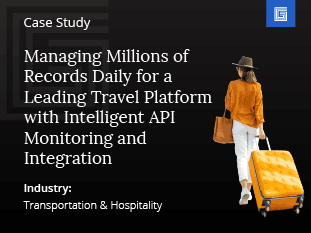
Improving Care Access and Experience Through Scalable Application Architecture for a National Healthcare Provider
| Client | Industry | Solution Provided | Technologies Used |
|---|---|---|---|
| National Healthcare Provider | Healthcare & Life Sciences | Secure application architecture, microservices integration, HIPAA-compliant development, mobile and web app engineering, patient and provider experience optimization | React, Angular, .NET, JavaWorld, Cypress, Selenium, Cassandra, Kafka, Spring Cloud, Oracle |
The Need
This healthcare provider set out to improve communication between patients and their care teams, while ensuring security and performance across a growing portfolio of care delivery applications. Rapid shifts in healthcare delivery models—particularly the transition to telehealth—added urgency to modernization efforts.
Key challenges included:
- Productivity Barriers in Clinical Tools: High error rates in clinician-facing apps hindered care delivery and delayed decision-making
- Patient Engagement Gaps: The existing patient app lacked accessibility features and modern capabilities to support digital-first healthcare experiences
- Compliance and Security Demands: HIPAA and other regulatory standards required rigorous implementation across the application ecosystem
- Ecosystem Scalability: Legacy architecture made it difficult to scale services across multiple care applications and user types
The Solution
Gorilla Logic served as a long-term engineering partner to help the healthcare provider scale and modernize its application ecosystem. The team worked across critical product lines, implementing technical strategies that improved user experience, performance, and compliance readiness.
Key solution elements included:
- New Patient-Facing Apps: Designed and delivered native iOS and Android applications, as well as a secure web portal, to support appointment scheduling, messaging, care tracking, telehealth, and accessibility
- Accessibility-Driven UX: Integrated features like screen readers, dark mode, and text scaling to ensure inclusivity for visually impaired patients
- Microservices Integration: Architected and expanded microservices across the ecosystem to connect patient and clinical apps with backend systems and third-party platforms
- Telehealth Enablement: Rapidly implemented secure telehealth functionality in response to COVID-19, enabling patients to access virtual care directly from the app
- Resilient Error Handling Architecture: Developed a scalable approach to error handling that improved clinician productivity and has since been replicated across other systems
- Secure Development Practices: All engineers completed HIPAA training and upheld strict data privacy protocols across development cycles
Results
Expanded Access to Digital Care: Delivered secure, intuitive mobile and web experiences that allowed patients to communicate with providers, manage care, and attend virtual appointments with ease.
Systemic Improvements to Care Delivery: Enabled faster, more accurate clinical workflows through integrated, error-resistant applications.
Scalable Architecture: Built reusable frameworks and services that supported new features and system-wide performance improvements.
Cross-Platform Consistency: Delivered unified experiences across mobile and web platforms for patients, providers, and care partners.
Operational Impact: Reduced application issues and improved reliability across the healthcare ecosystem with error-handling architecture.


